Industrial Visionaries
Welcome to Industrial Visionaries—the podcast where industry leaders and innovators share actionable strategies and real-world applications for transforming manufacturing operations. Hosted by ZJ van de Weg, CEO of FlowFuse, each episode dives into the cutting-edge technologies and ideas shaping the future of manufacturing. Whether you’re an industry professional seeking modernization insights or simply curious about the digital revolution in manufacturing, Industrial Visionaries provides the expertise and inspiration you need to stay ahead.
Episodes

Thursday Jun 26, 2025
Thursday Jun 26, 2025
The assumption that manufacturing networks are secure because they're "air-gapped" or "isolated" represents one of the most dangerous blind spots in industrial cybersecurity today. Kevin Wood, Chief IIoT Architect (Global) at Cisco, regularly encounters operations teams confident in their network security until visibility tools reveal unknown devices and vulnerabilities they never suspected existed. He says the communication gap between these teams often stems from language barriers rather than fundamental disagreements about security priorities.
In his chat with ZJ, Kevin discusses how Cisco's approach to industrial networking leverages decades of enterprise security best practices adapted for manufacturing environments, including ruggedized hardware with conformal coating and native industrial protocol support. They also explore Kevin's framework for treating networks as the most powerful sensor environment in manufacturing operations, capable of detecting threats and automatically applying security policies based on device behavior and vulnerability profiles. His team's methodology focuses on building migration strategies that acknowledge the reality of brownfield manufacturing environments, where legacy machinery often comes with vendor-mandated networking requirements that create security vulnerabilities spanning decades-old operating systems that cannot be patched.
Topics discussed:
The persistent communication gap between OT and IT teams and how language barriers mask shared security objectives in manufacturing environments.
Why air-gapped networks create false security assumptions and how maintenance laptops, USB drives, and other access points compromise supposedly isolated systems.
The distinction between Industry 3.0 and 4.0 readiness, focusing on complete secure connectivity as the defining characteristic rather than automation alone.
How dark pools of disconnected manufacturing data prevent effective AI and machine learning initiatives, forcing organizations to rely on synthetic data with synthetic results.
Treating industrial networks as sensor environments rather than just data highways, enabling dynamic security policy application based on device behavior and vulnerability profiles.
Migration strategies for brownfield manufacturing environments that acknowledge vendor-mandated networking requirements and legacy equipment constraints.
The compensating controls approach to protecting legacy machinery that cannot be patched, using network-level security policies to contain vulnerabilities.
Cloud connectivity challenges in manufacturing, including latency considerations when virtualizing control systems and multi-tenancy security concerns.
Why security functions as an innovation enabler rather than an obstacle, requiring proactive threat prevention to support digital transformation initiatives.
The importance of paranoid security mindset in manufacturing leadership, acknowledging that visibility gaps create attack vectors regardless of perceived isolation.
Listen to more episodes:
Apple
Spotify
YouTube
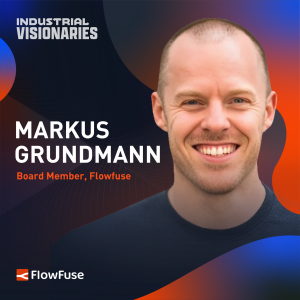
Wednesday Jun 18, 2025
Wednesday Jun 18, 2025
In this episode of Industrial Visionaries, ZJ sits down with Markus Grundmann, board member at FlowFuse and partner at Senovo VC, to discuss the investment thesis behind FlowFuse and the broader industrial digitalization market. Markus shares his perspective on why the first wave of Industry 4.0 investments failed to deliver and how software-native companies are positioned differently in today's market.
What you'll learn:
Why most Industry 4.0 investments failed to create successful exits and what made those approaches fundamentally flawed
How Node-RED's widespread adoption across HiveQ customers revealed the market opportunity for enterprise-grade industrial software platforms
The three mega markets VCs focus on and why industrial tech represents an underserved opportunity despite massive value creation potential
Why VC funding in industrial tech is more challenging due to pattern matching and lack of historical success stories
How software-native founders approach industrial problems differently than hardware-originated teams
The competitive advantage of being early in less crowded markets where quality wins over marketing spend
Why Europe's largest pump installation relies on "smell and feel" maintenance while a BMW provides more operational intelligence
How ecosystem thinking and API-first strategies separate platform companies from incremental feature developers
Listen to more episodes:
Apple
Spotify
YouTube
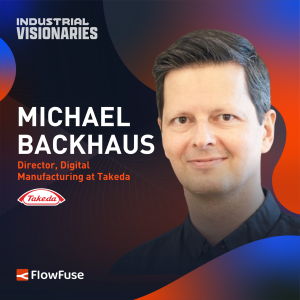
Monday Jun 16, 2025
Monday Jun 16, 2025
Digital transformation in pharmaceutical manufacturing faces unique challenges that aren't present in other industrial sectors. In this episode of Industrial Visionaries, Michael Backhaus, Director of Digital Manufacturing at Takeda, provides an inside look at how one of the world's leading pharmaceutical companies balances innovation with stringent GxP compliance requirements. Michael walks ZJ through Takeda's strategic approach to empowering site-level innovation within a regulated framework, allowing their 25+ manufacturing sites to digitize at their own pace while maintaining regulatory compliance.
From their successful paperless transformation initiative that's "exploding" with adoption across their network to their pragmatic data architecture philosophy of "as local as possible, as global as needed," Michael shares how Takeda is making progress toward their ultimate vision: fully autonomous manufacturing operations where algorithms and feedback loops maintain critical parameters with minimal human intervention.
Topics discussed:
Regulated digitalization framework allowing individual manufacturing sites to implement solutions at their own pace within GxP compliance constraints, creating a balance between innovation and patient safety requirements.
Network-wide demand capture methodology that identifies common pain points across multiple manufacturing sites before investing in solutions, ensuring digital initiatives address actual manufacturing challenges rather than implementing technology for its own sake.
Paperless transformation initiative that empowers site-level engineers to create their own GxP-compliant digital forms and workflows, resulting in rapid adoption across the manufacturing network without central mandates.
Takeda’s "as local as possible, as global as needed" IT architecture strategy that accommodates site-specific manufacturing processes while standardizing data structures for centralized analytics and cross-site reporting.
Compliance-first ROI framework that prioritizes regulatory requirements over traditional return calculations for certain projects, while still maintaining value-based decisions for non-mandatory digital initiatives.
Demand-driven adoption approach that eliminates resistance by focusing on solutions that directly address manufacturing pain points, creating pull rather than push for new technologies.
Data harmonization strategy that transforms site-specific data formats before integration into central data lakes, enabling analytics while preserving site autonomy in data collection processes.
Low-code enablement for engineers that allows manufacturing professionals to create their own dashboards and visualizations without deep programming knowledge, democratizing data access across the organization.
Vision for autonomous manufacturing that leverages algorithmic feedback loops to maintain critical parameters in biological processes, potentially reducing human intervention while improving product consistency and quality.

Thursday May 08, 2025
Thursday May 08, 2025
Regis Ataides brings a unique perspective to industrial digital transformation, combining mechanical engineering expertise with business acumen developed over decades at companies like Embraer, Siemens, and now as Vice President of Metris, ANDRITZ.
In his conversation with ZJ on this episode of Industrial Visionaries, Regis shares why performance-based contracts have become the most effective way to drive digital adoption in manufacturing environments, and why companies must start small but think big to achieve meaningful transformation. His insights on aligning stakeholder interests across organizations provide a practical blueprint for anyone navigating the complex world of industrial technology implementations.
Topics discussed:
Implementing shared-risk agreements where payment is tied directly to achieving specific, measurable KPIs like energy reduction, or productivity improvements — creating true alignment with customer goals.
Why successful digital transformation requires convincing many different people across an organization, each requiring different messaging, from ROI discussions with CFOs to ESG initiatives with CEOs and workflow improvements for shop floor personnel.
Implementing focused digital initiatives with quick, measurable wins that generate ROI for reinvestment, rather than attempting comprehensive transformation all at once, while maintaining a larger vision.
How artificial intelligence solutions like Metris Copilot are breaking down barriers by enabling natural language interaction with shop floor data, allowing operators to query complex information without technical expertise.
Tactical strategies for introducing digital solutions into existing manufacturing environments versus designing new digital-native facilities, with practical considerations for each scenario.
When to implement cloud computing versus on-premise solutions based on internet connectivity, data processing requirements, and latency sensitivity, with real-world implementation considerations.
Methods for creating measurable, short-term KPIs that distribute risk appropriately between technology providers and manufacturers while ensuring meaningful progress toward transformation goals.
Why people considerations must come first in digital transformation initiatives, especially when replacing legacy systems that employees have invested decades in developing and maintaining.
Listen to more episodes:
Apple
Spotify
YouTube
Website
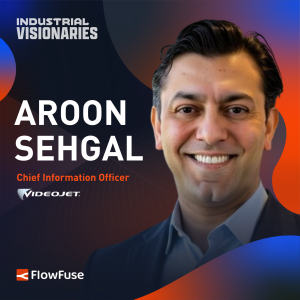
Thursday Apr 24, 2025
Thursday Apr 24, 2025
In manufacturing, the biggest challenge isn't implementing technology — it's blending technology with business needs to deliver real value. Aroon Sehgal, Chief Information Officer at Videojet, has mastered this intersection through his "glocal" approach to digital transformation.
In this episode of Industrial Visionaries, he walks ZJ through how manufacturing leaders can empower frontline workers to create their own digital solutions while maintaining enterprise security and control. Aroon reveals their strategic implementation of Tulip's citizen development platform, their disciplined "Wednesday release" schedule for production changes, and their zero-trust architecture for maintaining data security.
He also shares candid insights about managing an aging workforce while recruiting college talent with digital skills, and why single-piece flow manufacturing should be the starting point for any digital transformation initiative.
Topics discussed:
How Videojet Technologies balances enterprise-scale solutions with locally-developed tools that address specific factory needs, using ROI as the primary metric for determining what gets scaled across the organization.
Aroon's strategic approach to citizen development, providing sandbox environments with live production data where factory workers can design custom solutions without disrupting production.
The structured Wednesday release cycle that enables manufacturing operations to implement changes safely, with specific considerations for financial materiality and revertibility of changes.
Implementing robust data governance while making critical information accessible to those who need it, through named data stewards responsible for cleanliness and security.
How decentralized manufacturing operations can benefit from unified data architectures, but only when driven by clear business objectives rather than technology-first thinking.
Aroon's vision for completely blurring the lines between technology and business teams within the next 5-10 years, breaking down organizational silos to increase speed of innovation.
Practical strategies for managing an aging manufacturing workforce while recruiting and developing digitally-skilled talent, including both performance management and college recruitment approaches.
Why manufacturing leaders should begin digital transformation by focusing on labor efficiency and single-piece flow to produce higher yield per labor input.
Listen to more episodes:
Apple
Spotify
YouTube

Tuesday Mar 04, 2025
Tuesday Mar 04, 2025
In this episode of Industrial Visionaries, Hicham Ghriss, Digital Factory Director, at IDEMIA, walks ZJ through implementing Industry 4.0 within highly regulated security technology manufacturing. Drawing from computer science foundations and seventeen years of industry experience, Hicham explains how IDEMIA balances innovation with security requirements.
He also discusses their approach to global standardization, strategies for achieving significant OEE improvements through smart monitoring, and emphasizes why focusing on people and change management drives digital transformation success. Hicham offers valuable perspectives on implementing industrial IoT while maintaining strict compliance standards.
Topics discussed:
Implementation of Industry 4.0 initiatives within highly regulated security manufacturing environments, balancing innovation with compliance requirements.
Development of standardization strategies that respect local constraints while maintaining global process alignment across manufacturing sites.
Achievement of significant OEE improvements through smart monitoring and predictive maintenance implementations in secure manufacturing environments.
Creation of effective shop floor engagement programs that encourage innovation while maintaining security protocols.
Management of data access and governance in highly regulated manufacturing environments while promoting operational transparency.
Implementation of edge computing solutions to maintain security while enabling real-time data analysis and visualization.
Development of technology adoption processes that prioritize value creation and security compliance in manufacturing operations.
Integration strategies for legacy equipment within modern IoT frameworks while maintaining security standards.
Building scalable solutions that balance complexity with security requirements across global manufacturing operations.
Importance of change management and people-first approaches in successful digital transformation initiatives.
Listen to more episodes:
Apple
Spotify
YouTube
Website

Thursday Feb 20, 2025
Thursday Feb 20, 2025
With a 25-year career spanning rail transportation, automotive manufacturing at Renault, and now food production at Bel Group, Rémy Beraud, Industry 4.0 Director, offers unique insights into implementing Industry 4.0 initiatives at scale.
In their discussion on this episode of Industrial Visionaries, Rémy tells ZJ about Bel Group’s innovative approach to data collection across global sites, the importance of standardization in technical infrastructure, and their successful framework for IT-OT collaboration through digital pillars.
Rémy also emphasizes the critical nature of value-driven transformation and shares candid advice about managing technical debt while maintaining momentum in digital initiatives.
Topics discussed:
Implementation of a comprehensive digital transformation methodology incorporating both technical innovation and workforce development across global operations.
Development of standardized data collection strategies using OPC UA and edge computing platforms to manage diverse industrial equipment effectively.
Creation of digital pillars in factories to facilitate collaboration between IT, OT, and industrial performance teams for improved project outcomes.
Strategic approach to measuring digital transformation progress through value-based KPIs and standardized data models across multiple sites.
Management of technical debt and infrastructure investments to enable sustainable digital transformation initiatives.
Unique challenges and opportunities in digitizing food manufacturing compared to automotive and other industrial sectors.
Implementation of edge platforms and connectivity solutions to standardize data collection across diverse global manufacturing sites.
Development of cross-functional teams to drive digital transformation while maintaining focus on business value and ROI.
Integration of lean manufacturing principles with digital transformation initiatives for enhanced operational efficiency.
Strategies for securing management buy-in through value-driven project planning and technical debt management.
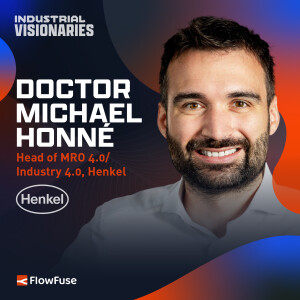
Thursday Feb 06, 2025
Thursday Feb 06, 2025
From traditional industrial adhesives to smart materials that detect their own failures — that's the journey Dr. Michael Honné, Head of MRO 4.0/Industry 4.0 at Henkel is leading at Henkel's LOCTITE Pulse division. Michael discusses how Henkel leverages its deep chemical expertise to create innovative digital maintenance solutions.
He also tells ZJ about their transition from product-focused to solution-driven business models, practical approaches to scaling digital implementations, and their strategic vision for combining chemical knowledge with digital capabilities.
Topics discussed:
Development of predictive maintenance solutions combining chemical expertise with digital technologies for enhanced industrial operations.
Strategic approach to scaling digital solutions across multiple sites while maintaining ROI and customer value proposition.
Implementation of subscription-based business models and the transition from product-focused to solution-driven operations.
Integration of chemical expertise with digital capabilities to create innovative monitoring and maintenance solutions.
Practical considerations for successful digital transformation, including build vs. buy decisions and partnership strategies.
Future trends in industrial digitalization, including the application of generative AI and smart chemical compounds.
Development of self-monitoring adhesives and coatings that function as their own sensors without additional hardware.
Strategic balance between chemical knowledge and digital innovation in creating sustainable competitive advantages.
Best practices for manufacturing companies seeking to implement digital transformation initiatives effectively.
Listen to more episodes:
Apple
Spotify
YouTube
Website

Thursday Dec 19, 2024
Thursday Dec 19, 2024
In this episode of Industrial Visionaries, our host ZJ van de Weg, CEO of FlowFuse, speaks with Trenton Ingrim, Senior Director of Advanced Manufacturing, Industry 4.0 at GE Appliances. Trenton shares his extensive experience in engineering and operations, highlighting the transformative impact of digitalization in manufacturing.
Trenton touches on the implementation of data visualization through the "Brilliant Factory" concept, which has led to significant efficiency gains, and strategies for balancing innovation with standardization across multiple sites. Additionally, Trent discusses the importance of upskilling the workforce to embrace new technologies, ensuring that GE Appliances remains at the forefront of the industry.
Topics discussed:
The concept of the "Brilliant Factory" and how GE Appliances uses data visualization to enhance operational transparency and empower employees across the organization.
Achieving significant manufacturing gains of 5 to 8% through the democratization of data, enabling quicker decision-making and improved efficiency in factory operations.
The importance of assessing existing automation systems and prioritizing projects that deliver the best return on investment for manufacturing processes.
Strategies for balancing innovation and standardization across multiple manufacturing sites, ensuring consistent quality while fostering a culture of creativity and improvement.
The role of workforce upskilling in adapting to new technologies and maintaining a competitive edge in the rapidly evolving manufacturing landscape.
Leveraging partnerships with educational institutions to develop tailored training programs that equip employees with essential skills in robotics and automation.
The challenges and opportunities of integrating legacy equipment with modern automation systems to create a seamless manufacturing environment.
Insights into the future of robotics and automation in consumer goods manufacturing, emphasizing the need for product design to accommodate advanced technologies.
The significance of maintaining an entrepreneurial mindset within manufacturing organizations to drive innovation while managing operational risks effectively.
The impact of digital twins and simulation technologies on enhancing manufacturing processes and enabling better predictive maintenance strategies.
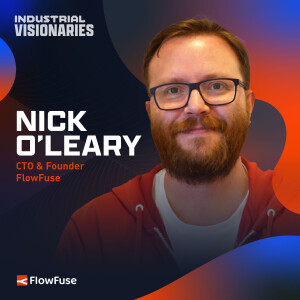
Monday Nov 25, 2024
Monday Nov 25, 2024
In our inaugural episode of Industrial Visionaries, our host ZJ van de Weg, chats with fellow FlowFuse exec, Nick O’Leary, CTO & Founder. Nick, who is also the creator of Node-RED, shares his extensive insights into the evolution of the Internet of Things (IoT). He discusses the early days of IoT and the transformative role of edge computing, highlighting how increased computing power has shifted data processing closer to devices.
Nick also explores the significance of open-source software in driving grassroots innovation within enterprises and the advantages of low-code development in creating flexible IoT solutions. Tune in to discover how these trends are shaping the future of technology and empowering engineers across industries!
Topics discussed:
The early challenges of IoT and how connectivity issues shaped the development of protocols like MQTT for efficient data transmission in constrained environments.
The shift from centralized data processing to edge computing, allowing for smarter, decentralized solutions that enhance real-time decision-making in industrial applications.
The grassroots adoption of Node-RED within organizations, driven by engineers recognizing its value and integrating it into their daily workflows for problem-solving.
The importance of open-source software in fostering innovation and collaboration, enabling teams to experiment without the constraints of commercial licensing agreements.
The role of low-code development in democratizing technology, empowering non-developers to create IoT solutions and contribute to projects effectively.
The operational challenges organizations face when scaling Node-RED, including security, management, and ensuring consistent deployment across multiple instances.
How FlowFuse addresses the needs of enterprises by providing tools for managing Node-RED at scale, including role-based access control and audit logging.
The significance of community engagement in Node-RED's growth, with over 5,000 integrations available, showcasing its versatility and adaptability in various use cases.
Nick's reflections on the future of IoT, emphasizing the ongoing evolution of technology and the need for organizations to remain agile and innovative.


